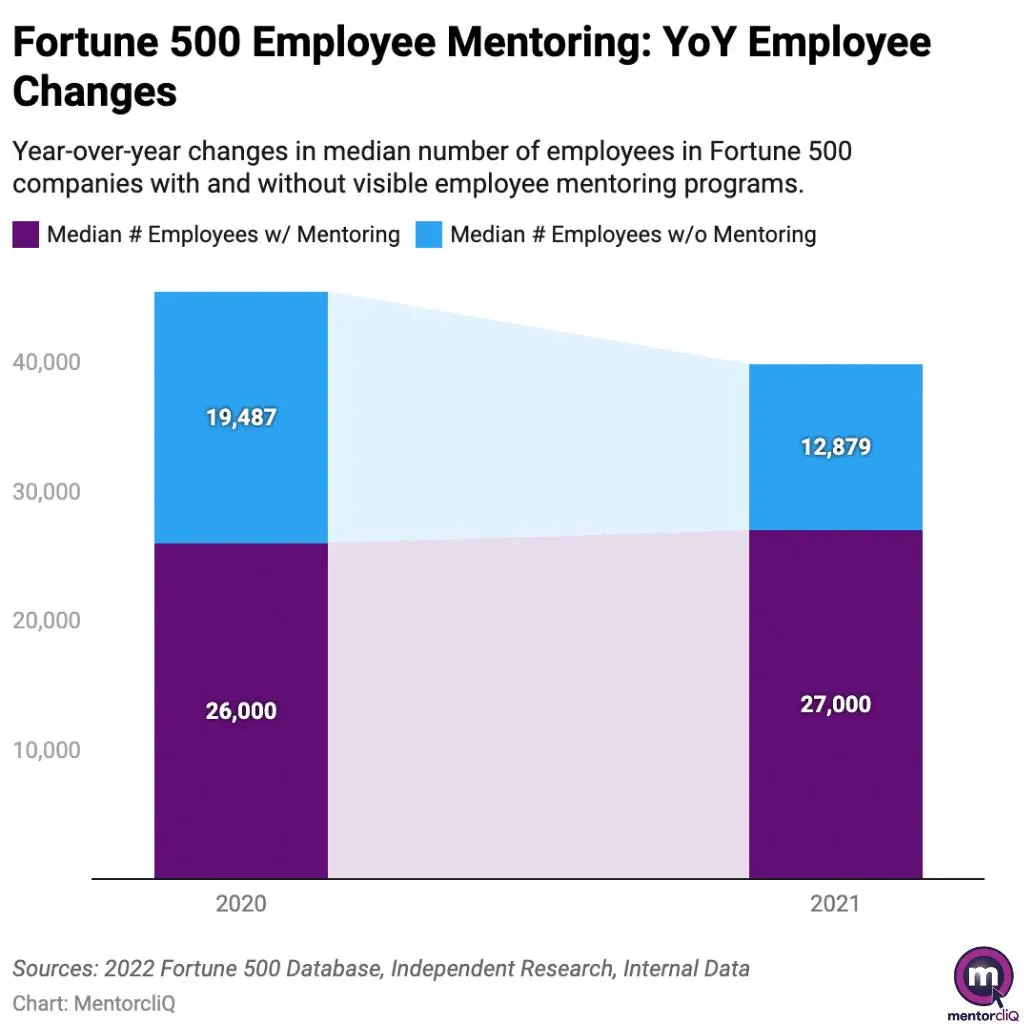Workplaces today are undergoing significant changes, and mentorship has become increasingly important. The introduction of new technologies and diverse workforce dynamics calls for a more integrated approach to knowledge sharing and skill development.
Mentorship is now a key element in nurturing a productive and engaged workforce, offering a platform for experienced professionals to guide and support newer employees, which in turn enhances the overall productivity and harmony within the organization.
Employee growth and personal development are highly valued, and mentorship offers a tailored approach to achieving these goals. However, when mentorship programs are aligned with an organization’s goals, they become a powerful force in achieving strategic objectives.
Aligning mentorship with organizational goals also builds employees’ sense of unity and purpose. Such strategic alignment improves individual performance and also propels the collective success of the organization, and in this article you’ll learn how to get there.
What Are Mentorship Programs?
Mentorship in a corporate context is a relationship where experienced professionals provide guidance, support, and knowledge to less experienced colleagues. It’s a collaborative process where mentors share their insights and experiences, helping mentees navigate the complexities of the workplace.
This relationship extends beyond just skill transfer. It’s seen in offering advice, fostering professional growth, and helping mentees understand the organizational culture and politics. The essence of corporate mentorship lies in its ability to create a nurturing environment for professional growth. Mentors act as role models, advisors, and coaches, offering a safe space for mentees to discuss challenges and explore career aspirations.
Different Models of Mentorship Programs
There are several mentoring program formats, each offering unique benefits and suited to different organizational needs. Three of the most common formats companies utilize include:
- One-on-one mentorship: The most traditional model involves a direct relationship between a mentor and a mentee. This model allows for personalized guidance and a deep understanding of the mentee’s individual needs and goals. It’s particularly effective in providing focused, tailored advice and support.
- Group mentorship: Where a single mentor works with multiple mentees to foster team dynamics and shared learning experiences.
- Peer-to-peer mentorship: Where colleagues at similar career stages mentor each other, encouraging mutual growth and learning among colleagues.
Each model has its strengths, and the choice depends on the specific objectives and structure of the organization.
Key Components of Successful Mentorship Programs
Successful mentorship programs begin with setting clear objectives and goals. These goals serve as a roadmap, guiding both mentors and mentees toward desired outcomes. Defining what the program aims to achieve is crucial, whether it’s skill development, career progression, or enhancing leadership capabilities.
- Clear objectives ensure that mentoring relationship remains focused and purpose-driven, providing tangible benchmarks for success. Having specific aims also allows for customizing mentorship experiences to meet individual needs.
- Goals can be aligned with personal career aspirations, organizational needs, or both, leading to a more fulfilling and effective mentorship experience.
Matching mentors and mentees
The matching process is a critical component of a successful mentorship program. Effective pairing involves matching mentors and mentees based on a broad variety of categories that can include, but are not limited to:
- Compatible skills
- Experiences
- Personalities
- Location
- Time zone
- Language
- Personal preferences
A thoughtful pairing process can significantly enhance the effectiveness of the mentorship experience because compatibility ensures that the mentee receives relevant guidance and that the mentor can provide meaningful support.
Best practices for pairing include assessing the needs and goals of mentees, as well as the expertise and interests of mentors. This assessment can be achieved through enrollment surveys, while the matches are significantly more effective when participants are paired using algorithm-based matching software.
*How* Your Match Matters
Download Our Free Guide on Matching Styles
Additionally, giving mentees the flexibility to choose their mentors or even change them can lead to better relationship outcomes.
Training and resources
Training for mentors might include sessions on:
- How to give effective feedback
- Developing emotional intelligence (EQ)
- Fostering mentee development
For mentees, training could include:
- Setting realistic goals
- Communication skills
- How to maximize the benefits of the mentorship relationship
Access to resources such as professional development materials, online courses, and networking opportunities can also significantly enhance the mentorship experience. These resources support the learning and growth objectives of the mentorship, ensuring that both parties have the tools they need to succeed.
Monitoring and evaluating progress
Regular check-ins and feedback sessions about mentorship relationships provide opportunities to assess the progress toward set goals and make adjustments as needed. Regular assessment also helps identify areas of success and improvement, allowing for continual refinement of the mentorship program.
These evaluations can be formal, like scheduled reviews, or informal, like casual conversations about the mentee’s experience and progress.
Using metrics and benchmarks to measure the success of the mentorship relationship is also important. These might include the achievement of specific goals, improvements in job performance, or increased job satisfaction.
Impact of Mentorship on Employee Growth
Mentorship plays a crucial role in developing hard and soft skills.
Through mentorship, mentees gain access to the practical knowledge and expertise of their mentors. That knowledge transfer helps them acquire role-specific technical or hard skills relevant to their field. This hands-on learning is often more impactful than traditional training methods, as it is tailored to the mentee’s specific needs and learning style.
In addition to hard skills, mentorship is instrumental in developing soft skills such as communication, leadership, problem-solving, and adaptability. It provides real-world examples and scenarios that challenge mentees to develop and refine these skills.
This holistic approach to skill development prepares mentees for a wide range of professional challenges and opportunities.
Career pathing
Mentors can provide deep insights into career options, industry trends, and potential growth opportunities that mentees may not realize exist. This guidance is invaluable for mentees, especially those in the early stages of their careers — or considering a career change.
Mentors use their own experiences and industry knowledge to help mentees understand the implications of different career choices. They can advise on strategic career moves, networking strategies, and skill development paths. This personalized advice helps mentees make informed career decisions that align with their long-term professional goals.
Innovation and creativity
Mentorship fosters a culture of innovation and creativity within the workplace. Mentors encourage mentees to think critically, challenge existing processes, and explore new ideas. This helps mentees develop a mindset that values innovation and creative problem-solving.
Through mentorship, mentees gain the confidence to experiment and take risks, which is essential for innovation. Mentors provide a safety net, offering support and guidance while allowing mentees to explore and learn from their experiences.
Enhancing professional networks
Mentors often introduce their mentees to industry contacts, opening doors to networking opportunities that might otherwise be inaccessible. These connections can lead to collaborations, job opportunities, and valuable partnerships and even sponshorship
Furthermore, mentorship helps mentees learn the art of networking. Mentors can provide tips on effective networking strategies, how to maintain professional relationships and ways to leverage these connections for career advancement. This aspect of mentorship is especially beneficial for young professionals who are just beginning to build their professional networks.
Mentorship and Employee Satisfaction
When experienced professionals take the time to guide and support their colleagues, it fosters a culture of collaboration and mutual respect. This environment encourages employees to share knowledge, learn from each other, and feel valued in their roles, which in turn enhances overall workplace morale.
A nurturing workplace created through mentorship also helps reduce workplace stress and conflicts. Mentors can provide guidance on navigating workplace challenges and interpersonal dynamics, creating a more harmonious work environment. Support is crucial in not just retaining talent but also in attracting new employees who seek a supportive and growth-oriented workplace.
In the corporate mentorship process, the effective use of software for HR management, particularly in hiring and onboarding, can be pivotal in ensuring new employees are swiftly integrated into company culture and readily paired with mentors. This seamless transition fosters a more robust and meaningful mentorship experience from the start.
And when new hires are matched into an onboarding mentoring program they are far less likely to quit, reducing your early turnover rates.
Job Morale and Engagement
Mentorship has a profound impact on job morale and engagement. Employees who have access to mentors often feel more connected to their organization through personalized guidance and support.
Additionally, mentorship fosters a sense of belonging and recognition.
Mentees feel their contributions are acknowledged and valued, which increases their commitment and enthusiasm towards their work. Engaged employees are more likely to be proactive, motivated, and dedicated to their jobs.
A culture of learning and development
Mentorship establishes an environment where learning is a continuous process, and employees are encouraged to grow and evolve professionally. Mentors serve as catalysts for this learning culture, inspiring mentees to pursue new knowledge and skills actively.
This culture of continuous learning is beneficial for both the individual and the organization: it ensures that employees keep up with industry trends and developments, maintaining the organization’s competitive edge.
Moreover, a learning-oriented culture is appealing to employees who value personal and professional development, aiding in talent attraction and retention.
Personal fulfillment and career satisfaction
Through the guidance and support of a mentor, mentees often achieve greater clarity about their career path and goals. This clarity leads to a sense of fulfillment, as employees feel they are progressing toward their aspirations.
The personal connection and trust built in a mentor-mentee relationship add to the sense of contentment. Mentees benefit from a supportive figure who is invested in their success, which can be incredibly rewarding and fulfilling. The satisfaction gained from this relationship often translates into greater job satisfaction and a more positive outlook on their career trajectory.
Retention Through Mentorship
Implementing mentorship programs is an effective strategy for reducing employee turnover.
MentorcliQ clients who run software-enabled mentoring see an average increase in retention of over 40% among mentoring program participants.
Mentoring programs provide employees with opportunities for growth, development, and personalized support, which are key factors in employee retention. When employees feel that their professional development is a priority for the organization, they are more likely to stay and grow within the company.
During the great resignation, companies with mentoring programs were far likely to retain their employees. While there were likely many other factors in play, it’s a distinct indication that those companies that leaned hard into engagement strategies reaped the rewards.

Mentorship also enhances employee engagement and loyalty. When employees develop strong connections with their team, they establish bonds that reduce loneliness and increase the establish of a stronger company culture. They, in turn, value those relationships and culture enough to stay longer.
The crucial role mentorship plays in creating a loyal workforce is demonstrated through the organization’s commitment to its employees’ growth and well-being, which in turn cultivates loyalty. Generally, poor employee loyalty is seen in lower engagement. Low engagement is not only expensive but, according to Gallup, hit a 9-year high in 2023.
Employee loyalty is not just emotional; it also translates into higher productivity and a stronger commitment to the organization’s goals. When employees feel like their needs are met within the organization and that they belong, company goals are internalized. Employees who are mentored are more likely to exhibit a positive attitude, contribute constructively to team dynamics, and go above and beyond in their roles.
Cost-benefit analysis of mentorship programs
From a financial perspective, mentorship programs are a sound investment for organizations looking to reduce turnover and enhance their bottom line.
A cost-benefit analysis of mentorship programs often reveals significant financial benefits, particularly in terms of reducing turnover. The costs associated with high turnover — such as recruitment, training, and lost productivity — can be substantial. Gallup called turnover a $1 trillion problem, and that was before the Great Resignation and before our current engagement recession. Mentorship programs can mitigate these costs by enhancing employee retention, thereby reducing the need for frequent hiring and training.
The investment in mentorship programs is often outweighed by the savings from reduced turnover. Additionally, the increase in productivity and engagement among mentored employees can lead to better business outcomes, further justifying the investment in these programs.
Mentoring Program ROI Calculator
Enter the following values to calculate the mentoring program ROI:
Cultivating a Thriving Workforce through Effective Mentorship
As we’ve established, mentorship programs offer numerous benefits that significantly impact individual growth, organizational culture, and business success.
They accelerate professional and personal development, enhancing both hard and soft skills. They foster a supportive work environment, boost job morale, and enhance employee engagement, leading to higher job satisfaction and retention.
Mentorship also encourages a culture of continuous learning and development, which is crucial for maintaining a competitive edge. It strengthens the workforce by building a network of supportive professional relationships, encouraging innovation, and preparing employees for leadership roles.
Mentorship programs are not just a nice-to-have but a must-have in today’s business environment. It’s time to take action by implementing or enhancing mentorship programs in your organizations. For enterprise companies that want to make sure mentoring is available widely across, that means scaling with a software-based approach like MentorcliQ that automates all steps of the process.
Book a demo to learn why companies like Join the movement toward mentoring that companies like Disney, Nasdaq, Accenture, Hilton and many more have joined the mentoring movement powered by MentorcliQ.




